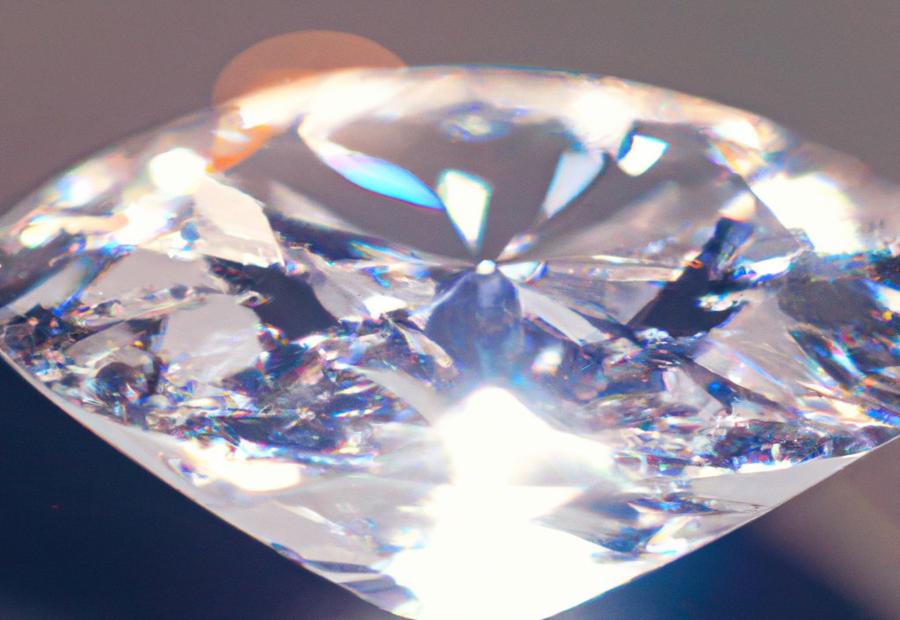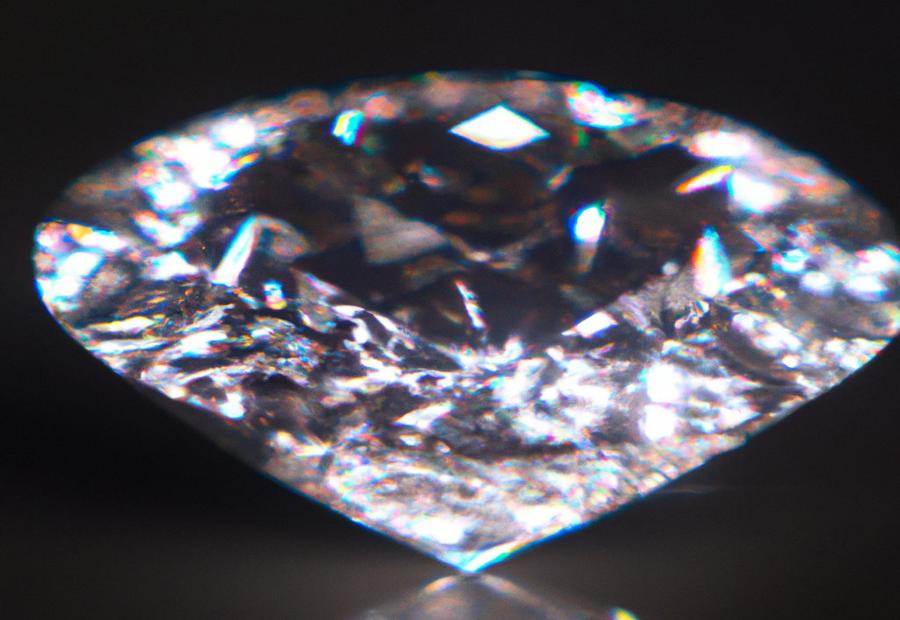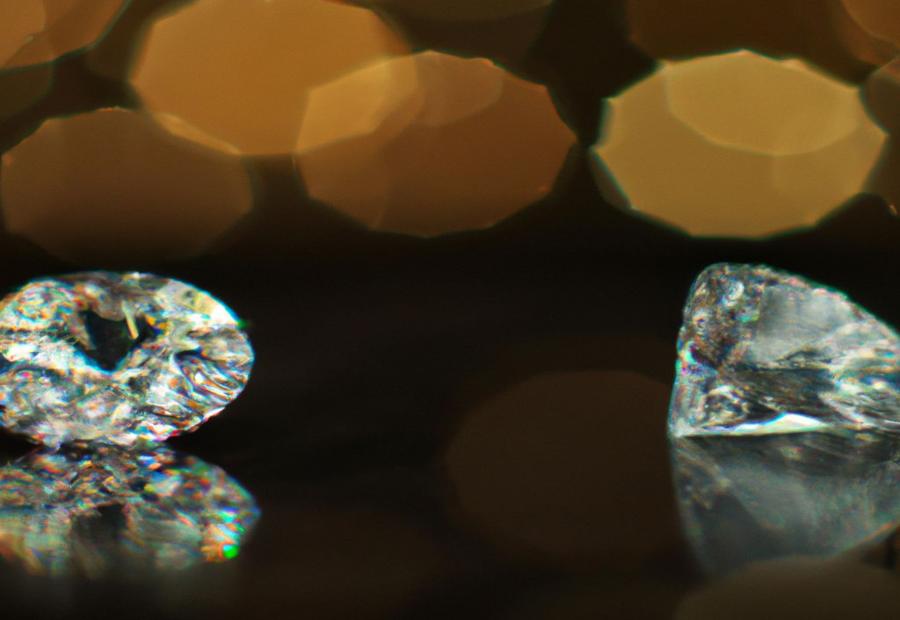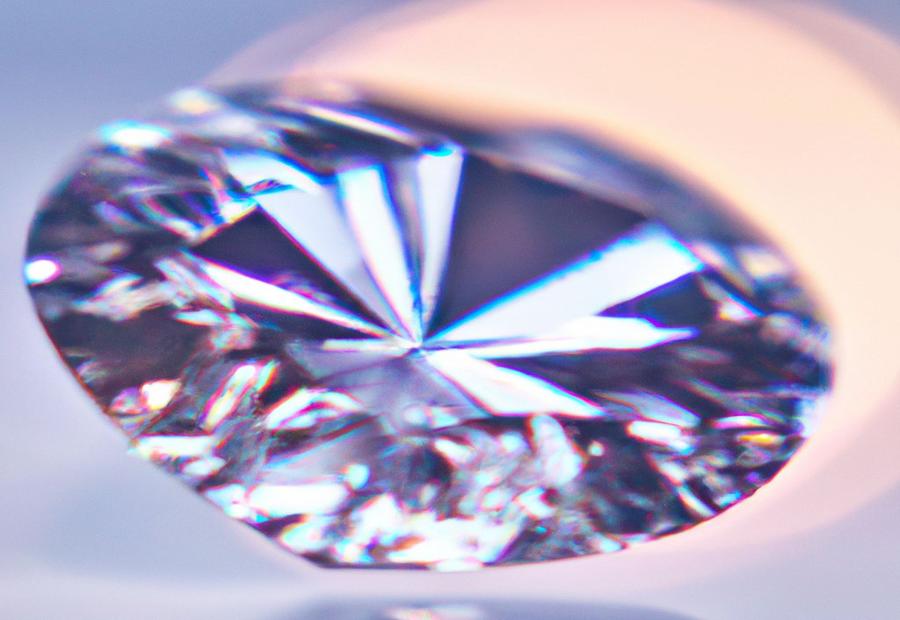What are the ethical considerations for buying lab grown diamonds?
Key takeaway:
- Ethical considerations are important when purchasing diamonds, and the rise of lab grown diamonds provides an ethical alternative.
- Traditional diamond mining has significant environmental impact and ethical implications.
- Lab grown diamonds offer environmental benefits and ethical labor practices.

Photo Credits: Www.Lab-Grown-Diamond-Ring.Com by Kenneth Hall
With ethical implications becoming increasingly important in consumer choices, it’s crucial to understand the significance of ethical considerations when it comes to purchasing diamonds. In this section, we will explore the importance of ethical considerations in diamond purchasing decisions and the growing trend of lab-grown diamonds as an ethical alternative. So, join us as we delve into the fascinating world of ethical diamond buying and its impact on the diamond industry.
The importance of ethical considerations in diamond purchasing decisions
The need for ethical considerations when buying diamonds cannot be overstated. Mining diamonds has caused worries about the environment and ethics. But, lab grown diamonds are a great choice that help with these issues. This shows the increasing importance of ethics in diamond buying.
Mining diamonds is bad for the environment. It involves digging up land, cutting down trees, and polluting water. This destroys habitats and hurts climate change. Lab grown diamonds don’t damage the environment like this. They are made in a more sustainable way.
Not only that, but there are ethical problems with mined diamonds too. People have reported human rights violations, and children working in bad conditions. Lab grown diamonds support ethical standards. Companies are open about how they make them and make sure workers are taken care of.
Lab grown diamonds have many benefits ethically. They are better for the environment, and support fair labor. When you buy lab grown diamonds, you show you care about the planet and people’s rights. This helps the diamond industry become more sustainable.
The rise of lab grown diamonds as an ethical alternative
The sparkle of traditional diamond mining can come with a hefty price; environmental destruction and ethical issues. Lab-grown diamonds, however, provide an ethical alternative. Consumers are turning to these diamonds as a responsible choice due to their smaller environmental footprint.
The process of growing diamonds in a controlled environment eliminates land excavation, reduces water usage, and prevents the release of harmful chemicals. This makes lab-grown diamonds a more sustainable option that aligns with ethical values.
Lab-grown diamonds also have ethical advantages when it comes to labor practices. The traditional diamond mining industry has been linked to exploitative working conditions, child labor, and human rights violations. On the contrary, the lab-grown diamond industry is known for its commitment to fair labor practices and safe working conditions.
The rise of lab-grown diamonds is driven by consumer awareness and a desire to make informed choices. By educating consumers on the benefits of lab-grown diamonds, it is easier for individuals to make decisions that align with their ethical values. Hence, the demand for lab-grown diamonds is likely to continue increasing.
Ethical concerns with traditional diamond mining

Photo Credits: Www.Lab-Grown-Diamond-Ring.Com by Peter Jackson
Traditional diamond mining raises significant ethical concerns, particularly in terms of its environmental impact and ethical implications. The detrimental effects on the environment are a cause for alarm, while the ethical implications surrounding labor practices and human rights violations are equally important. In this section, we will delve into these two sub-sections, shedding light on the environmental consequences of traditional diamond mining and exploring the ethical considerations associated with this industry.
Environmental impact of traditional diamond mining
Traditional diamond mining has been noted for its negative environmental effects. The Reference Data outlines ethical issues, particularly its environmental consequences. It’s widely known it leaves destruction in its wake.
The Reference Data documents the environment damage. This includes extensive excavation and soil removal, disrupting ecosystems and destroying natural habitats. Additionally, heavy machinery and explosives are used during extraction, leading to air and noise pollution. Moreover, it requires a lot of water, depleting local sources and threatening communities.
Moreover, paragraph 2 mentions risks of soil erosion and deforestation. The mining process clears land, causing deforestation and biodiversity loss. Also, it causes soil erosion, making it hard for plants to survive.
But, lab-grown diamonds offer a reduced environmental impact. Unlike mined diamonds, they require little land use and don’t contribute to deforestation or habitat destruction. Choosing lab-grown diamonds over mined ones reduces environmental impacts and promotes sustainable practices in this industry.
Ethical implications of traditional diamond mining
Traditional diamond mining has numerous ethical issues. It causes deforestation, soil erosion, and water pollution, which can harm local communities and ecosystems. Reports also reveal exploitative working conditions and human rights abuses, including child labor and forced labor. Lab grown diamonds offer a more ethical option and have unique properties. They share similar physical and chemical characteristics, but are created in a lab rather than extracted from the earth.
Consumers are increasingly becoming aware of the ethical implications of traditional diamond mining. Demand for lab grown diamonds is rising due to their environmental and ethical benefits. Therefore, lab grown diamonds sparkle brighter than traditional mining when it comes to ethical considerations.
The ethical advantages of lab grown diamonds
With lab grown diamonds, ethical advantages abound. Discover the environmental benefits of this alternative, as well as the ethical labor practices shaping the industry. It’s time to explore how lab grown diamonds are revolutionizing ethical standards.
Environmental benefits of lab grown diamonds
Lab-grown diamonds offer various environmental benefits that make them a great choice for ethical shoppers.
- Compared to traditional diamond mining, lab-grown diamonds have a much lower environmental impact.
- The production of lab-grown diamonds requires fewer resources and less energy.
- No hazardous chemicals are used, creating a safer working environment.
- No destruction of natural habitats or disruption of wildlife populations.
- An eco-friendly option for individuals concerned about their ecological footprint.
With the growing demand for lab-grown diamonds, shoppers can make mindful purchasing decisions. By choosing lab-grown diamonds, individuals can support sustainability in the jewelry industry.
Lab-grown diamonds have several advantages over traditionally mined ones. They require less land excavation, reducing damage to ecosystems. The production process also consumes less energy and emits fewer greenhouse gases. No hazardous chemicals are used, eliminating health risks for workers and nearby communities. All these environmental benefits make lab-grown diamonds a great option for conscious consumers.
As people become more aware of the negative impacts of diamond mining, more individuals are looking for alternatives that match their values. By spreading awareness and supporting sustainable practices, shoppers can make informed decisions while promoting positive change.
Take Sarah, for example. She was passionate about sustainability, so she wanted her engagement ring to reflect her values. After researching, she found out about lab-grown diamonds and was amazed by their environmental benefits. She felt joy knowing she was making an ethically responsible decision without compromising on the beauty and symbolism of her ring.
Ethical labor practices in the lab grown diamond industry
The lab grown diamond industry is devoted to ethical labor practices. These practices ensure workers are treated fairly, in line with international standards. Reference data stresses the importance of ethical diamond buying, especially as lab grown diamonds become more popular. It also explains the environmental benefits of these diamonds. Additionally, it dives into the ethical issues with traditional diamond mining, such as environmental impacts.
Lab grown diamond companies prioritize ethical labor. They provide safe workplaces that meet international standards and fair wages. They also promote diversity and inclusion in their workforce. This creates an environment where everyone can contribute to the industry.
It’s important to recognize how these ethical practices draw conscientious consumers who care about sustainability. By choosing lab grown diamonds, consumers back an industry that values ethics and sustainability.
Reference data in “The Rise of Lab Grown Diamonds as an Ethical Alternative,” shows companies in this industry are committed to ethical labor practices.
Comparison between lab grown and mined diamonds

Photo Credits: Www.Lab-Grown-Diamond-Ring.Com by Mark Smith
When it comes to lab grown and mined diamonds, understanding the similarities and differences between them is key. In this section, we will explore these aspects, shedding light on what makes them similar and what sets them apart. By delving into these facets, we can gain a clearer perspective on the ethical considerations associated with buying lab grown diamonds compared to their mined counterparts.
Similarities between lab grown and mined diamonds
Lab grown and mined diamonds are alike in many ways. They both have a diamond cubic crystal structure, they’re equally hard (10 on the Mohs scale), and they both have colorless or fancy colored varieties with high brilliance and fire. Furthermore, they are both highly valuable and sought after for their rarity, beauty, and symbolism.
To decide between the two, consider what is important to you. Think about your preferences, budget, and the moral implications of each option. Acknowledge these similarities and use them to evaluate your choices objectively. Opt for the diamond that aligns with your values and meets your needs.
Differences between lab grown and mined diamonds
Lab grown diamonds and mined diamonds have key differences. The way they are created or obtained is different. Lab grown diamonds are made in a lab with technology. Mined diamonds come from the earth with traditional methods. This difference causes various disparities in their characteristics and environmental impact.
A table shows the differences:
| Lab Grown Diamonds | Mined Diamonds | |
|---|---|---|
| Creation | Lab with tech | Earth with traditional methods |
| Characteristics | Identical properties | Natural variations |
| Environmental Impact | Minimal disruption | Significant land disturbance, destruction, and pollution |
By comparing these aspects, consumers can understand the distinctions. Lab grown diamonds may be more environmentally friendly, but they still have the same value.
Another unique aspect of lab grown diamonds is the control over ethical labor practices. Since lab grown diamonds are made in a lab, concerns about unethical working conditions or human rights violations are eliminated.
Consumer awareness and choice

Photo Credits: Www.Lab-Grown-Diamond-Ring.Com by Keith Nguyen
Consumer awareness and choice are pivotal when it comes to exploring the ethical considerations for purchasing lab-grown diamonds. By educating consumers about the intricacies of lab-grown diamonds and helping them make informed decisions between lab-grown and mined diamonds, we can empower individuals to make ethical choices in the diamond market.
Educating consumers about lab grown diamonds
The market for lab-grown diamonds has been increasing due to ethical dilemmas concerning conventional diamond mining. Lab-grown diamonds offer a sustainable, ethical option.
To make the right buying choices, consumers must be informed about the benefits of lab-grown diamonds. They should know the environmental advantages of these diamonds and the ethical labor practices in this industry.
Besides this, informing consumers about lab-grown diamonds needs to include details on the similarities and differences between lab-grown and mined diamonds. This allows them to pick the one that best suits their needs.
To empower customers, providing them with full knowledge about lab-grown diamonds is essential. This lets them make smart decisions that match their moral values while enjoying the beauty of diamond jewelry. Picking between lab grown and mined diamonds is like deciding between saving money and saving the planet – it’s a diamond dilemma with ethical sparkle.
Making an informed decision between lab grown and mined diamonds
The decision-making process between lab-grown and mined diamonds includes various factors. These are ethical considerations, environmental impact, and labor practices.
To decide between them, compare their key aspects. These are environmental impact, ethical implications, and similarities.
| Lab Grown Diamonds | Mined Diamonds |
| – Environmental benefits | – Environmental impact |
| – Ethical labor practices | – Ethical considerations |
Apart from these, other factors should be considered. These may include price, durability, availability, and personal preferences.
Due to awareness of ethical issues with traditional diamond mining, diamond buying has changed. Lab grown diamonds are seen as a more ethical alternative, making them a viable option for jewelry.
Conclusion
Lab-grown diamonds have several ethical considerations which buyers have to think about before buying. These diamonds are made in a lab with advanced processes, so mining is not needed. This means less environmental harm and fewer bad working conditions for miners.
One worry is that natural diamond miners may lose their jobs due to the increasing demand for lab-grown diamonds. This could cause economic difficulties in mining communities. It is important for buyers to think about the wider impacts of their choices.
Another ethical issue is transparency and disclosure. Lab-grown diamonds are popular for their ethical advantages, but customers should check the origin and authenticity of what they buy. Labeling and certification must be accurate, to stop misleading marketing that could harm the ethical benefits.
Lab-grown diamonds are not totally without concerns. They need energy and resources to produce, and long-term effects on the industry are unknown. Buyers must weigh the ethical considerations before buying. Reduced environmental impact and avoiding bad mining practices are pros, but buyers should look at the wider social and economic effects and make sure everything is transparent. Understanding the relationship between lab-grown and natural diamonds is key.
Lastly, the increasing popularity of lab-grown diamonds has grown the sustainable jewelry market (source: Forbes).
Some Facts About Ethical Considerations for Buying Lab Grown Diamonds:
- ✅ Lab grown diamonds are more environmentally friendly compared to mined diamonds. (Source: Team Research)
- ✅ Lab grown diamonds are produced without involving poor working conditions found in traditional diamond mines. (Source: Team Research)
- ✅ Lab grown diamonds are guaranteed to be conflict-free. (Source: Team Research)
- ✅ Lab grown diamonds offer the same visual and chemical properties as mined diamonds. (Source: Team Research)
- ✅ Lab grown diamonds are more affordable compared to mined diamonds. (Source: Team Research)
FAQs about What Are The Ethical Considerations For Buying Lab Grown Diamonds?
What are the ethical considerations for buying lab-grown diamonds?
Lab-grown diamonds are considered a more ethical choice compared to traditionally mined diamonds due to several factors:
- Environmental Concerns: Lab-grown diamonds have a smaller environmental impact than diamond mining, which is known for causing soil erosion, deforestation, and pollution of water sources.
- Uprooting Wildlife: Traditional diamond mines often disrupt and uproot wildlife habitats, while lab-grown diamonds do not contribute to this issue.
- Poor Working Conditions: Unlike diamond mines, lab-grown diamond production does not involve the poor working conditions associated with traditional mines.
- Conflict-Free: Lab-grown diamonds are guaranteed to be conflict-free, meaning they are not sourced from areas associated with armed conflicts or human rights abuses.
- Price Difference: Lab-grown diamonds are more affordable than mined diamonds, allowing consumers to make a more ethical choice without compromising their budget.
What is the difference between lab-grown diamonds and traditionally mined diamonds?
The main difference between lab-grown diamonds and traditionally mined diamonds is their origin. Lab-grown diamonds are created in a controlled laboratory environment, while mined diamonds are extracted from the Earth. However, lab-grown diamonds are chemically and visually identical to mined diamonds. The only difference may be a small “LG” inscription on the base of the lab-grown diamond.
Are lab-grown diamonds environmentally friendly?
Yes, lab-grown diamonds are considered more environmentally friendly compared to mined diamonds. Traditional diamond mining operations contribute to greenhouse gas emissions, air pollution, and the depletion of natural resources. In contrast, lab-grown diamonds have a smaller environmental footprint and do not involve large-scale mining operations.
Do lab-grown diamonds have the same quality as traditionally mined diamonds?
Yes, lab-grown diamonds have the same visual and chemical properties as traditionally mined diamonds. They are nearly indistinguishable from each other, with no impurities or color differences. Lab-grown diamonds are considered chemically identical to mined diamonds.
What certification should I look for when buying lab-grown diamonds?
When purchasing lab-grown diamonds, it is important to look for third-party certification. Reputable lab-grown diamond retailers should provide evidence from independent certification schemes or organizations verifying the authenticity and ethical sourcing of their diamonds. This ensures that the lab-grown diamonds you are buying meet the necessary standards and uphold ethical practices.
Can I resell lab-grown diamonds?
Lab-grown diamonds may have lower resale value compared to traditionally mined diamonds. This is because the market for lab-grown diamonds is still developing, and the perception and demand for them may vary. However, as lab-grown diamonds gain more popularity and acceptance, the resale market may evolve, providing more opportunities for selling lab-grown diamonds in the future.



Leave a Reply